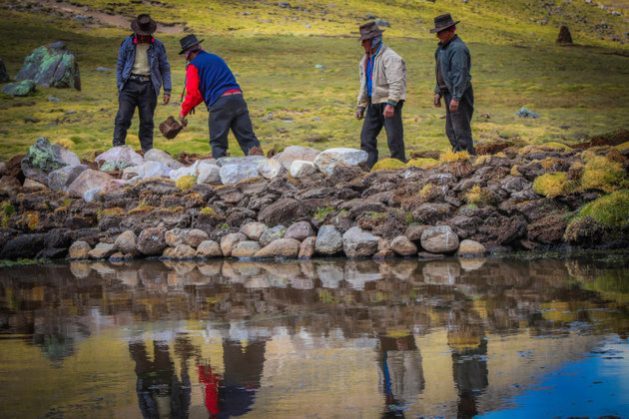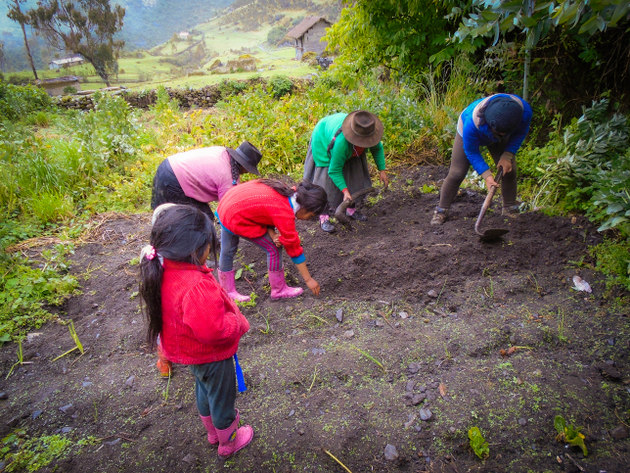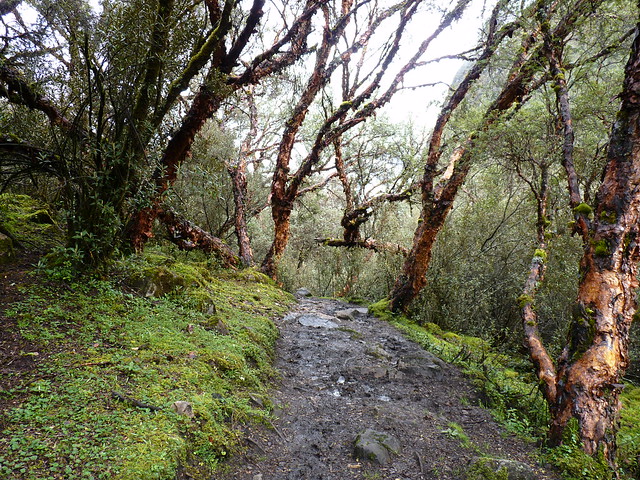Indigenous Farmers Harvest Water with Small Dams in Peru's Andes Highlands

AYACUCHO, Peru, Jun 29 (IPS) - A communally built small dam at almost 3,500 meters above sea level supplies water to small-scale farmer Cristina Azpur and her two young daughters in Peru's Andes highlands, where they face water shortages exacerbated by climate change.
"We built the walls of the reservoir with stone and earth and planted 'queñua' trees last year in February, to absorb water," she tells IPS by phone from her hometown of Chungui, population 4,500, located in La Mar, one of the provinces hardest hit by the violence of the Maoist group Shining Path, which triggered a 20-year civil war in the country between 1980 and 2000.
The queñua (Polylepis racemosa) is a tree native to the Andean highlands with a thick trunk that protects it from low temperatures. It is highly absorbent of rainwater and is considered sacred by the Quechua indigenous people.
In Chungui and other Andes highlands municipalities populated by Quechua Indians in the southwestern department of Ayacucho, the native tree species has been the main input for the recovery and preservation of water sources.
Eutropia Medina, president of the board of directors of Huñuc Mayu (which means "meeting of rivers" in Quechua), an NGO that has been working for 15 years to promote the rights of people living in rural communities in the region, one of the country's poorest, explains how the trees are used.

"The women and men have planted more than 10,000 queñua trees in the different communities as part of their plan to harvest water," she tells IPS in Ayacucho, the regional capital. "These are techniques handed down from their ancestors that we have helped revive to boost their agricultural and animal husbandry activities, which are their main livelihood."
Medina, previously director of the NGO, explains that the acceleration of climate change in recent years, due to the unregulated exploitation of natural resources, has generated an imbalance in highland ecosystems, increasing greenhouse gases and fuelling deglaciation and desertification.
The resultant water shortages have been particularly difficult for women, who are in charge of domestic responsibilities and supplying water, while also working in the fields.
Huñuc Mayu, with the support of the national office of Diakonia, a faith-based Swedish development organisation, has provided training and technical assistance to strengthen water security in these rural Andean highland communities where the main activities are small-scale farming and livestock raising.

This is an area that has recently been repopulated after two decades in which families fled the internal conflict, during which Ayacucho accounted for 40 percent of all victims.
"Huñuc Mayu helped organise the returnees and people who had remained in the communities, and we promoted the planting of fruit trees and connections to markets,"
She explains that "in this process more water and technical forms of irrigation were needed, so through a water fund the communities created projects for the conservation of basins and micro-basins in the area."
The impact is significant, she points out, because in the past families depended on the rains for their water supply and during the dry season and times of drought they had a very difficult time because they could not irrigate their crops or water their animals.

Today, things have changed.
Churia, a village of just 25 families at more than 3,100 meters above sea level, in the district of Vinchos, is another community that has promoted solutions to address the water shortage problem.
Oliver Cconislla, 23, lives there with his wife Maximiliana Llacta and their four-year-old son. The family depends on small-scale farming and animal husbandry.
"Here we depend on the alpaca, using its meat to feed and nourish the children, making jerky (dried meat, 'charki' in Quechua) to store it, and when we have enough food we sell to the market. We spin the wool, weave it and sell it too," he tells IPS over the phone.
His family has been able to count on grass and drinking water - absolutely vital to their livelihood - for their 50 alpacas and 15 sheep thanks to work by the organised community.
"We have been working to harvest water for three years," he says. "We've built dikes, we've been separating off the ponds and planting queñua trees on the slopes of the hill. Last year I was a local authority and we worked hand in hand with Huñuc Mayu."
Cconislla reports that they dammed six ponds using local materials such as grass, soil and clay - "only materials we found in the ground." They also fenced off the queñua plantations.
"Now when there is no rain we are no longer sad or worried because we have the ponds. The dam keeps the water from running out, and when it fills up it spills over the banks, creating streams that run down to where the animals drink so they have permanent pasture; that area stays humid even during times of drought," he says.
In addition to these ecosystem services, trout have been stocked in one of the ponds to provide food for families, especially children. "As a community we manage these resources so that they are maintained over time for the benefit of us and the children who will come," he states.
Cristina Azpur, 46, has no animals, but she does have crops that need irrigation. She runs the household and the farm with the help of her two daughters, ages 11 and 13, when they are not in school, because she does not have a husband, "since it is better to be alone than in bad company," she says, laughing.
For her and the other families living in houses scattered around the community of Chungui, the dam ensures that they have the water they need to grow their crops and raise their livestock, she says.
"I am about to plant potatoes, olluco (Ullucus tuberosus, a tuber whose leaves are also eaten), and oca (another tuber). This month of June we have had a small campaign (special planting of some crops between May and July), and we use water from the reservoir to ensure our food supply, which is the most important thing to stay healthy," she says proudly.
She politely adds that she cannot continue talking because she must help her daughters, who study remotely through programmes broadcast on public television, due to the lockdown in place in response to the COVID-19 pandemic.
In the neighbouring town of Oronccoy, home to some 60 families and founded in 2016, Natividad Ccoicca, 53, also grows her vegetables with water from a community-built reservoir.
She and her family, who live at an altitude of over 3,300 meters, have been part of an experience that has substantially improved their quality of life.
"It used to be very hard to fetch water," she tells IPS. "We had to walk long distances and even take the horses to carry the containers that we filled at the springs. Now with the reservoir we have water for the farm, the animals and our own consumption."
She also explains that because of the measures to curb the spread of COVID-19 there is greater demand for water in homes. "Can you imagine how things would be for us without the reservoir? We would have a higher risk of getting sick, that's for sure," she says.

These experiences of harvesting water are part of Huñuc Mayu's integral proposal for the management of hydrographic basins using Andean techniques in synergy with low-cost conventional technologies to strengthen water security.
Medina highlights the involvement of the communities and the active participation of women, who in the Quechua worldview have a close link with water.
"We see important achievements by the communities themselves and the local people," she says. "For example, the water supply has expanded in response to the demands of agricultural production and human consumption."
Medina adds that "women have been active participants in protecting the sources of water and the work involved in raising livestock has been reduced to the benefit of their health. These are major contributions that improve the quality of life of families" in this historically neglected part of Peru.
© Inter Press Service (2020) — All Rights Reserved. Original source: Inter Press Service
 Global Issues
Global Issues